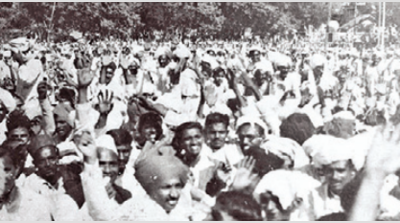- News
- City News
- rajkot News
- Arzi hukumat- Economic boycott that stifled Nawab's Junagadh
Trending
This story is from November 7, 2016
Arzi hukumat- Economic boycott that stifled Nawab's Junagadh
Amid growing IndoPak hostilities, the social media and instant messaging apps are replete with angry `boycott Chinese goods' messages to protest Beijing's support to our neighbour.

File photo of the Arzi Hukumat movement
RAJKOT: Amid growing IndoPak hostilities, the social media and instant messaging apps are replete with angry `boycott Chinese goods' messages to protest Beijing's support to our neighbour. While such patriotic calls aimed at targeting Chinese economy may not have the desired effect so soon, history books re veal that a similar movement had actually left Junagadh state financially paralyzed when its Nawab had refused to accede to India.
One of the most potent weapon during the `Arzi Hukumat movement', the campaign against Junagadh Nawab`s decision to merge with Pakistan, was economic boycott of the state.The details have been revealed in a book `Saurashtra no Itihas' (History of Saurashtra) penned by histo rian S V Jani. In fact, special boycott committees were constituted in various cities across India, which strategically planned the economic collapse of Junagadh state.Junagadh is gearing up to celebrate the Arzi Hukumat Day to commemorate Junagadh liberation and accession to the Indian Union.
“Among three major strategies adopted by freedom fighters led by Gandhiji's nephew Shamaldas, economic boycott was adopted as a tool to corner Nawab's state. In fact, the special `economic boycott department' was set up and headed by Pushpaben Mehta.Boycott committees were set up in Calcutta, Mumbai, Madras, Cochin, Malabar and other cities of the country ,“ writes Jani. The committees shot off letters to various institutions which obliged by stopping supply of crucial commodities like petrol, kerosene, garments, sugar and grains to Junagadh. The Indian government stopped supplying coal from October 1, 1947.
“The strategy paid off. The railway's daily income plummeted from Rs 30,000 to Rs 5,000 per day and residents, majority of whom were in favour of joining India, stopped paying taxes,“ said Jani in his two-volume book. Of the total 222 princely states in Saurashtra, Junagadh was the biggest with an annual income to the exchequer to the tune of Rs 86 lakh-Rs 90 lakh. Finally , left with no options, Junagadh declared its accession to the Indian Union on November 9, 1947. When Junagadh's economy got weakened due to boycotts, the Nawab turned to Pakistan for help. However, Pakistan demanded money for supply of essentials, which he couldn't afford, said Jani.
One of the most potent weapon during the `Arzi Hukumat movement', the campaign against Junagadh Nawab`s decision to merge with Pakistan, was economic boycott of the state.The details have been revealed in a book `Saurashtra no Itihas' (History of Saurashtra) penned by histo rian S V Jani. In fact, special boycott committees were constituted in various cities across India, which strategically planned the economic collapse of Junagadh state.Junagadh is gearing up to celebrate the Arzi Hukumat Day to commemorate Junagadh liberation and accession to the Indian Union.
“Among three major strategies adopted by freedom fighters led by Gandhiji's nephew Shamaldas, economic boycott was adopted as a tool to corner Nawab's state. In fact, the special `economic boycott department' was set up and headed by Pushpaben Mehta.Boycott committees were set up in Calcutta, Mumbai, Madras, Cochin, Malabar and other cities of the country ,“ writes Jani. The committees shot off letters to various institutions which obliged by stopping supply of crucial commodities like petrol, kerosene, garments, sugar and grains to Junagadh. The Indian government stopped supplying coal from October 1, 1947.
“The strategy paid off. The railway's daily income plummeted from Rs 30,000 to Rs 5,000 per day and residents, majority of whom were in favour of joining India, stopped paying taxes,“ said Jani in his two-volume book. Of the total 222 princely states in Saurashtra, Junagadh was the biggest with an annual income to the exchequer to the tune of Rs 86 lakh-Rs 90 lakh. Finally , left with no options, Junagadh declared its accession to the Indian Union on November 9, 1947. When Junagadh's economy got weakened due to boycotts, the Nawab turned to Pakistan for help. However, Pakistan demanded money for supply of essentials, which he couldn't afford, said Jani.
End of Article
FOLLOW US ON SOCIAL MEDIA











